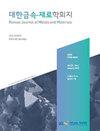金属氧化物负载电化学氧还原反应电催化剂研究进展
IF 1.4
4区 材料科学
Q4 MATERIALS SCIENCE, MULTIDISCIPLINARY
引用次数: 0
摘要
全球变暖和空气污染迫使人们更加关注新能源来取代化石燃料。聚合物电解质膜燃料电池由于具有零排放、高能量密度、高能效等优点,在众多环保能源中受到越来越多的研究。碳载铂催化剂是聚合物电解质膜燃料电池中常用的阴极催化剂。然而,Pt/C催化剂在启动/关闭条件下会腐蚀。由于碳的腐蚀会导致铂的团聚、分离和损失,从而导致性能的快速损失。金属氧化物在高电位下表现出较高的稳定性,是一种很有前途的替代载体。在几种金属氧化物中,钛氧化物和锡氧化物得到了广泛的研究。它们的性能与Pt/C催化剂相当,并且在模拟启动/关闭条件的加速压力测试中显示出比Pt/C催化剂更高的耐久性。本文综述了近五年来铂催化剂金属氧化物载体的研究进展。在最近的研究中,利用新的合成方法、退火温度、前驱体和掺杂剂改变了金属氧化物的特性,从而增强了ORR活性和耐久性。与最先进的Pt/C催化剂相比,先进的金属氧化物表现出高耐久性和可接受的性能。本文章由计算机程序翻译,如有差异,请以英文原文为准。
Review of Electro-catalysts Supported by Metal Oxides for Electrochemical Oxygen Reduction Reaction
Global warming and air pollution have forced greater attention to new energy sources to replace fossil fuels. Among several eco-friendly energy sources, polymer electrolyte membrane fuel cells have been increasingly investigated since they have zero emissions, high energy density, and high energy efficiency. Carbon-supported Pt catalyst is generally used for the cathodic catalyst in polymer electrolyte membrane fuel cells. However, Pt/C catalysts corrode under start-up/shut-down conditions. Pt agglomeration, separation, and loss can occur due to the carbon corrosion, which results in a rapid performance loss. Metal oxide is a promising candidate as an alternative support since it shows high stability in the high potential. Of several metal oxides, titanium oxides and tin oxides have been widely investigated. Their performance is comparable to the Pt/C catalyst, and they have shown even higher durability than the Pt/C catalyst in accelerated stress tests simulating start-up/shut-down conditions. In this paper, we summarize the development of metal oxide supports for the Pt catalyst in the five most recent years. In recent studies, the characteristics of metal oxides have been varied using new synthesis methods, annealing temperature, precursors, and dopants, which results in enhanced ORR activity and durability. Advanced metal oxides have shown high durability and exhibited acceptable performance compared to the state-of-the-art Pt/C catalysts.
求助全文
通过发布文献求助,成功后即可免费获取论文全文。
去求助
来源期刊

Korean Journal of Metals and Materials
MATERIALS SCIENCE, MULTIDISCIPLINARY-METALLURGY & METALLURGICAL ENGINEERING
CiteScore
1.80
自引率
58.30%
发文量
100
审稿时长
4-8 weeks
期刊介绍:
The Korean Journal of Metals and Materials is a representative Korean-language journal of the Korean Institute of Metals and Materials (KIM); it publishes domestic and foreign academic papers related to metals and materials, in abroad range of fields from metals and materials to nano-materials, biomaterials, functional materials, energy materials, and new materials, and its official ISO designation is Korean J. Met. Mater.
 求助内容:
求助内容: 应助结果提醒方式:
应助结果提醒方式:


